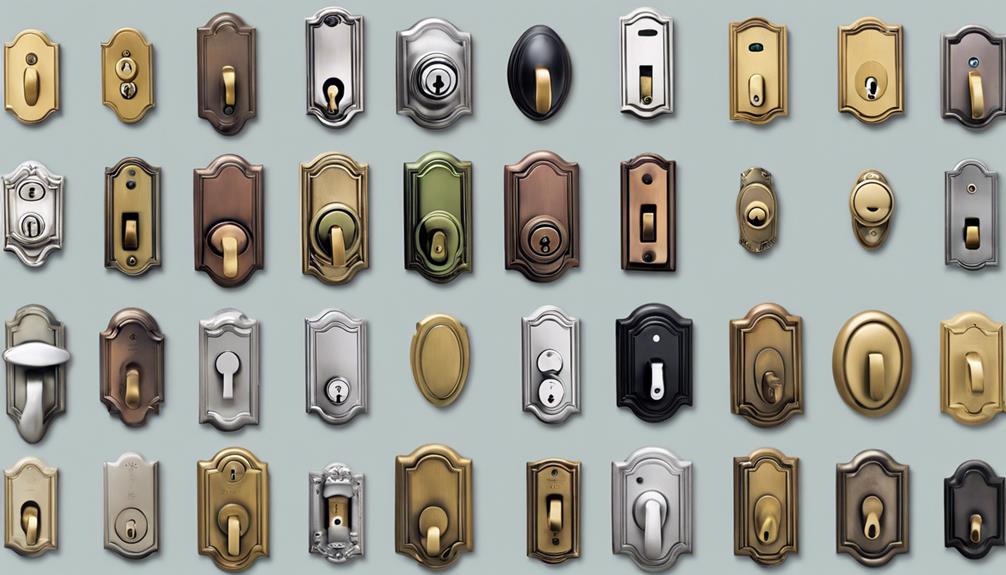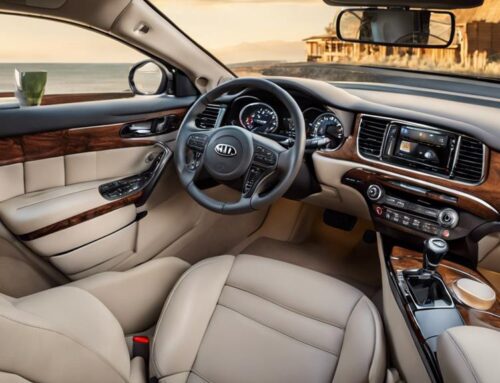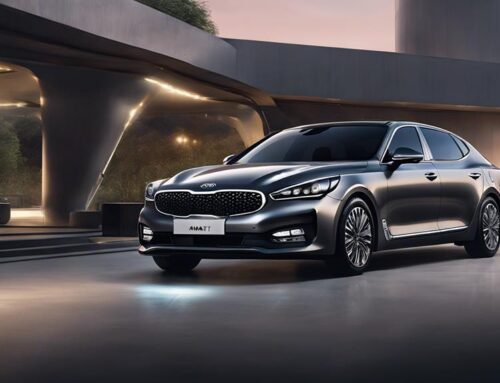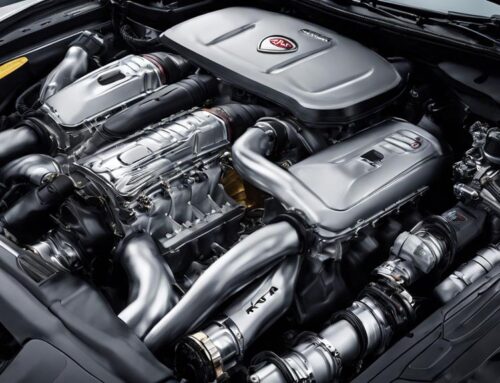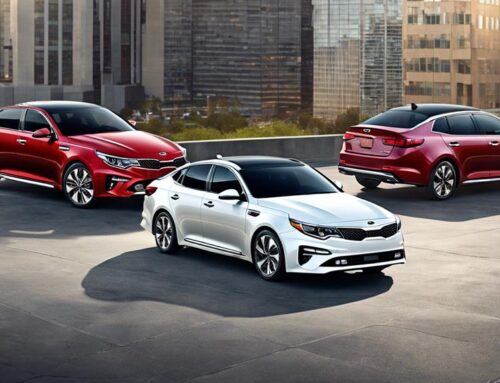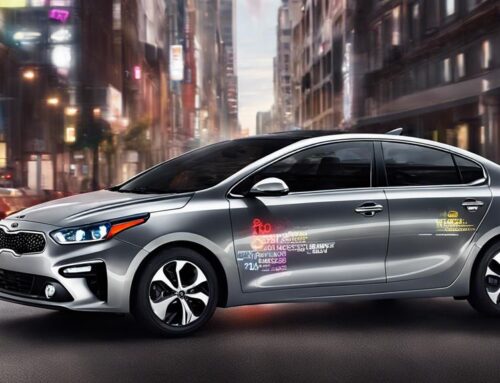When securing your home, choose the best lock for your front door by prioritizing security features like durability and resistance to break-ins. Consider installing two locks for added protection. Smart locks offer keyless entry and remote monitoring, while deadbolts are sturdy against forced entry. Opt for Grade 1 locks for maximum security. Guarantee proper installation and maintenance to extend lock lifespan. If you want to keep abreast of the latest trends, evaluate fingerprint sensors and retrofit smart locks. Remember, a secure front door lock is a significant investment for your home's safety and security.
Key Takeaways
- Consider high-security Grade 1 or Grade 2 locks for optimal protection.
- Evaluate lock types like smart, electronic, deadbolt, and combination for features.
- Prioritize material durability, proper installation, and maintenance for long-term security.
- Rekey locks for cost-effective security updates without full replacement.
- Stay informed on lock trends, testing, and advancements for enhanced home security.
Importance of Lock Security
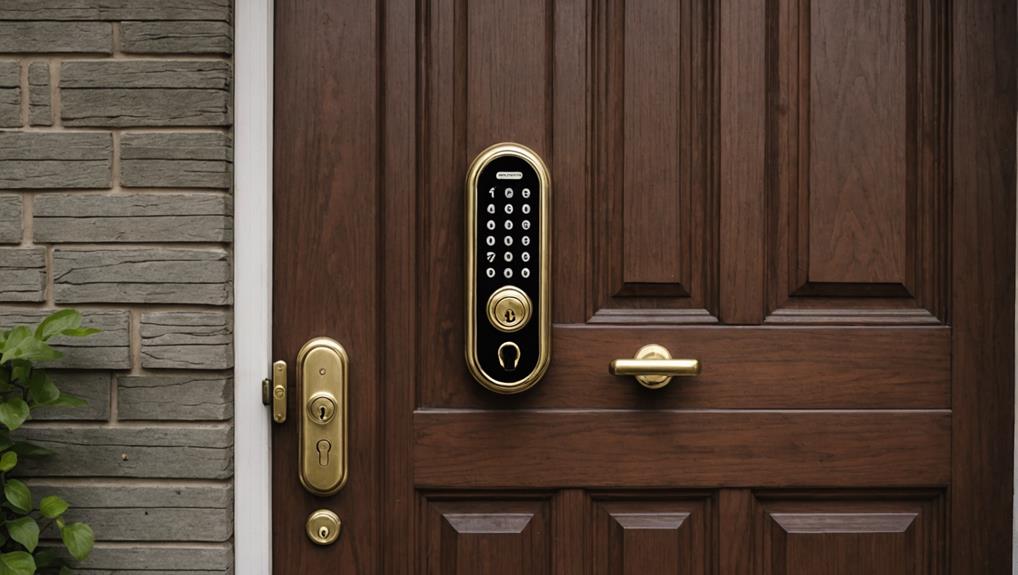
When it comes to safeguarding your home, the importance of lock security can't be overstated. Front door security plays a vital role in protecting your household from potential intruders. Investing in the best front door lock is paramount to enhance your home security.
High-quality locks act as the first line of defense against break-ins, proving more effective than alarms or CCTV systems. Data reveals that a staggering 76% of domestic burglaries in the UK occur through exterior doors, highlighting the significance of robust home security locks.
Additionally, it's important to take into account the durability of the locks you choose. Locks that are made of high-quality materials won't only withstand forced entry attempts but also resist wear and tear over time.
Having two locks on your front door can provide an additional layer of security by creating redundancy. If one lock malfunctions, the other can still offer protection. Deadbolts and high-security locks are essential components in fortifying your home against potential threats, as doors are the most common entry points for burglaries.
Ensuring you have reliable and sturdy locks installed on your front door not only enhances security but also brings peace of mind knowing your home is well-protected.
Types of Door Locks

When considering the types of door locks available for your front door, it's crucial to understand the key features and security ratings associated with each option.
Smart locks provide keyless entry with monitoring capabilities, while electronic locks offer keypad convenience.
Deadbolt locks are known for their resistance to forced entry, and knob locks are more suitable for interior use.
For an extensive guide on selecting appropriate locks for various entry points, including gates and windows, it's advantageous to research different locking mechanisms and their specific applications.
Lock Types Overview
Exploring the domain of door security, various types of locks serve different purposes, from traditional deadbolts to cutting-edge smart locks.
Smart Locks offer keyless entry through smartphone apps or key fobs, providing controlled access and monitoring capabilities. They can be easily added to existing keyed entry systems.
Electronic Locks, featuring keypads for entry, offer convenience and security without the need for physical keys, often paired with deadbolts for enhanced protection.
Deadbolt Locks, available in single, double, and vertical styles, are robust against forced entry, with heavy-duty strike plates further bolstering their security features.
Knob Locks, commonly used for both interior and exterior doors, are less secure externally due to their vulnerability to tampering, making them more suitable for indoor applications.
Combination Locks, requiring specific codes for access, provide added convenience and security, ideal for scenarios where multiple users need entry without sharing physical keys.
Key Features Comparison
Curious about the key features of different types of door locks? When choosing home locks, key features play an essential role in ensuring the security and convenience of your property. Here are some crucial lock selection tips to evaluate:
| Lock Type | Key Features |
|---|---|
| Smart Locks | Keyless entry, smartphone app control, remote access, and monitoring capabilities. |
| Electronic Locks | Keypad entry, battery-powered or mechanical, commonly paired with deadbolts for added security. |
| Deadbolt Locks | Robust resistance to forced entry, available in single, double, and vertical styles, requires heavy-duty strike plates. |
| Combination Locks | Require a numerical code for entry, providing convenience and added security, often used in conjunction with other lock types. |
Each type of lock offers unique benefits tailored to different security needs. By understanding these key features, you can make an informed decision when selecting the best lock for your front door.
Security Rating Importance
If you have been comparing key features of different types of door locks, you're likely aware of the significant role they play in ensuring the security and convenience of your property.
When it comes to security ratings, here are some essential points to reflect upon:
- Grade 1 locks offer the highest level of security, ideal for commercial use and strong resistance against forced entry.
- Grade 2 locks provide a good balance for residential properties, offering adequate protection at a reasonable price point.
- Grade 3 locks are the least secure option and aren't recommended for entry doors due to their lower durability and security features.
Remember that high-security locks often boast sturdy designs and materials, increasing their resistance to physical attacks and providing superior protection for your home.
Prioritize your specific security needs when selecting a door lock, as higher ANSI ratings typically indicate better performance against potential intruders.
Lock Installation Considerations
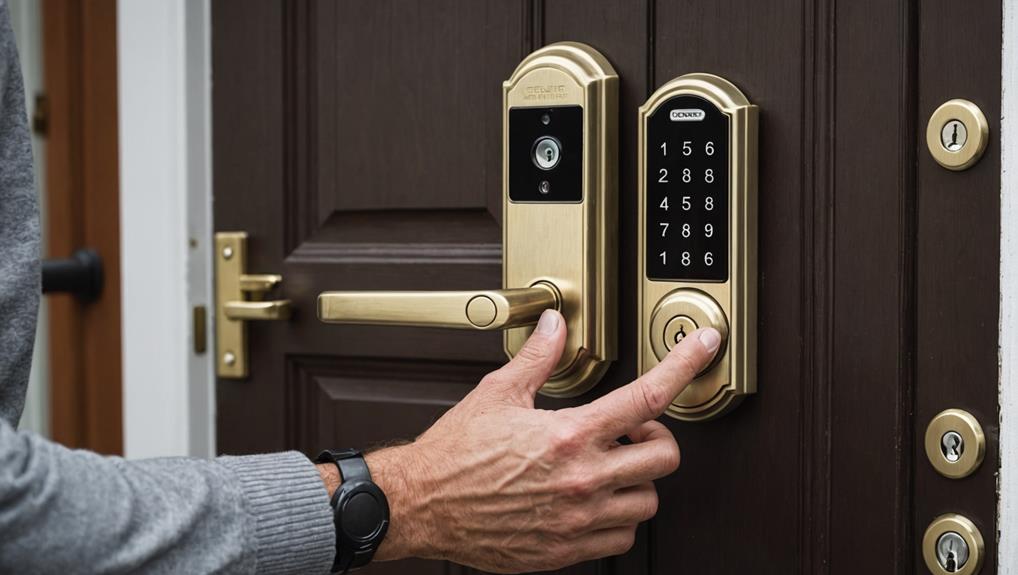
When considering lock installation for your front door, it is essential to prioritize factors that confirm proper function and security. Proper installation confirms that your chosen lock operates effectively to protect your home and loved ones. Here are some key considerations to keep in mind before installing a lock on your front door:
| Installation Considerations | Details | Importance |
|---|---|---|
| Material Durability | Choose high-quality materials like brass or steel for durability against wear and forced entry. | High |
| Security Grade | Check the ANSI Grade rating – Grade 1 for commercial use and Grade 2 for residential properties. | Medium |
| Compatibility | Confirm the lock fits your door type and thickness, considering materials like wood, uPVC, or metal. | High |
Lock Maintenance and Care
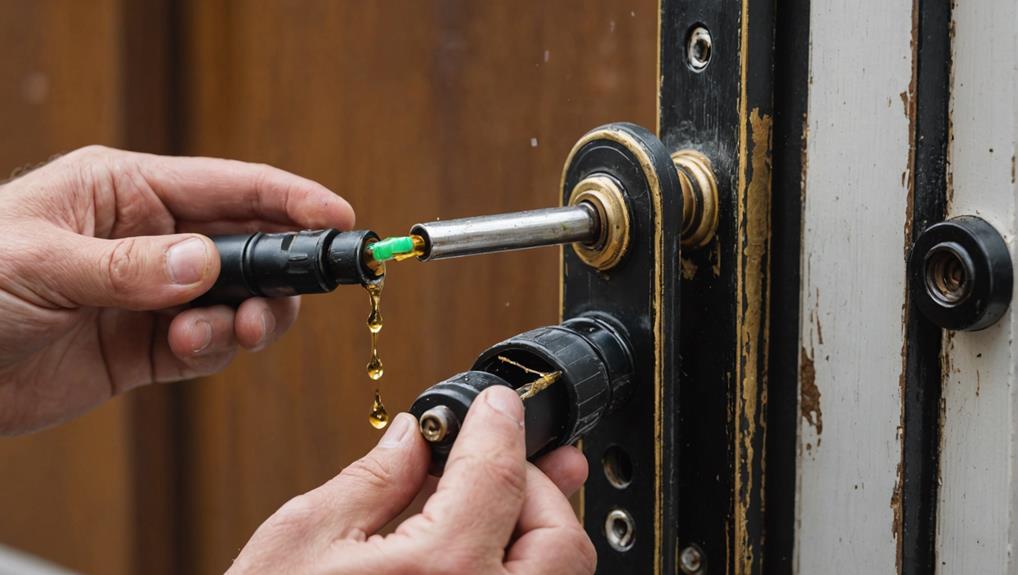
Regularly maintaining and caring for your front door locks is essential to confirm their best performance and longevity.
To guarantee your locks function smoothly and securely, follow these tips:
– Clean locks with care: Use a brush to remove dust and debris, avoiding harsh chemicals that could harm the finish and internal components.
Regular cleaning can also prevent buildup that might interfere with the security system installation around your home.
- Lubricate for smooth operation: Apply silicone-based or graphite lubricant as recommended by the manufacturer to prevent sticking and maintain functionality.
- Check screws and alignment: Periodically inspect and tighten screws in locksets and door frames, and confirm proper alignment to prevent stress on the lock mechanism.
Lock Changes and Rekeying
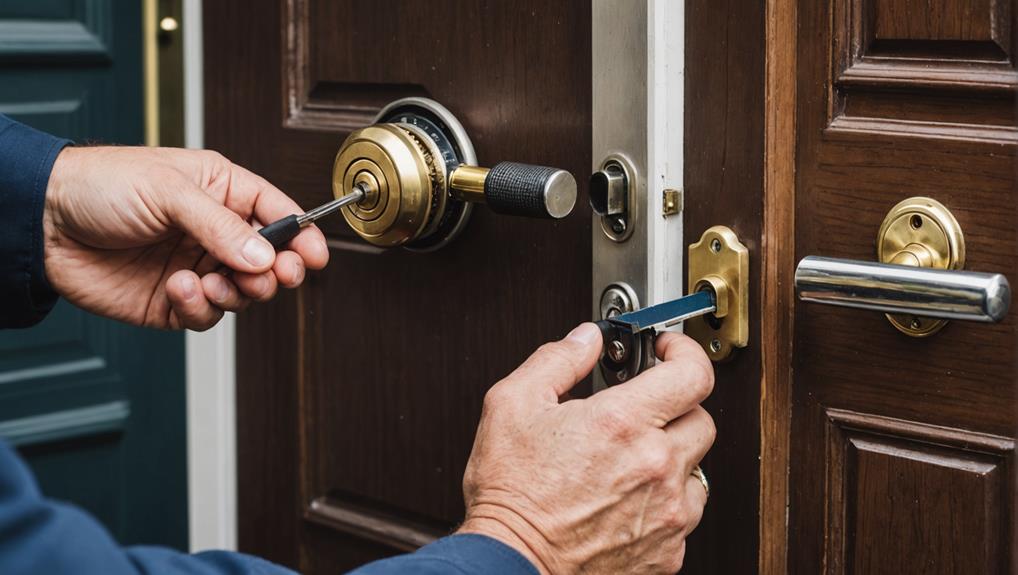
To maintain ideal security and address key-related concerns effectively, considering lock changes and rekeying is essential. Lock rekeying offers a cost-effective solution by resetting the internal cylinder of the lock, enhancing security without replacing the entire lock. This process, usually completed in under an hour, retains existing hardware, minimizing waste and disruption. Common reasons for lock changes include lost or stolen keys, moving into a new home, or upgrading security features after a break-in. Rekeying can considerably reduce security risks associated with unknown key history, particularly in new residences or after tenant turnover. When locks are worn or malfunctioning, replacing them can provide improved security, especially with higher-grade locks meeting ANSI Grade 1 standards.
| Benefits of Lock Changes and Rekeying | Details |
|---|---|
| Cost-Effective Security Enhancement | Resetting internal cylinder without replacing entire lock |
| Quick Process with Minimal Disruption | Completed in under an hour, retaining existing hardware |
| Addressing Key-Related Concerns Efficiently | Ideal for lost/stolen keys, moving to a new home, or upgrading security features |
| Enhancing Security with New Locks | Improved security, especially with ANSI Grade 1 standard locks |
Latest Trends in Door Locks
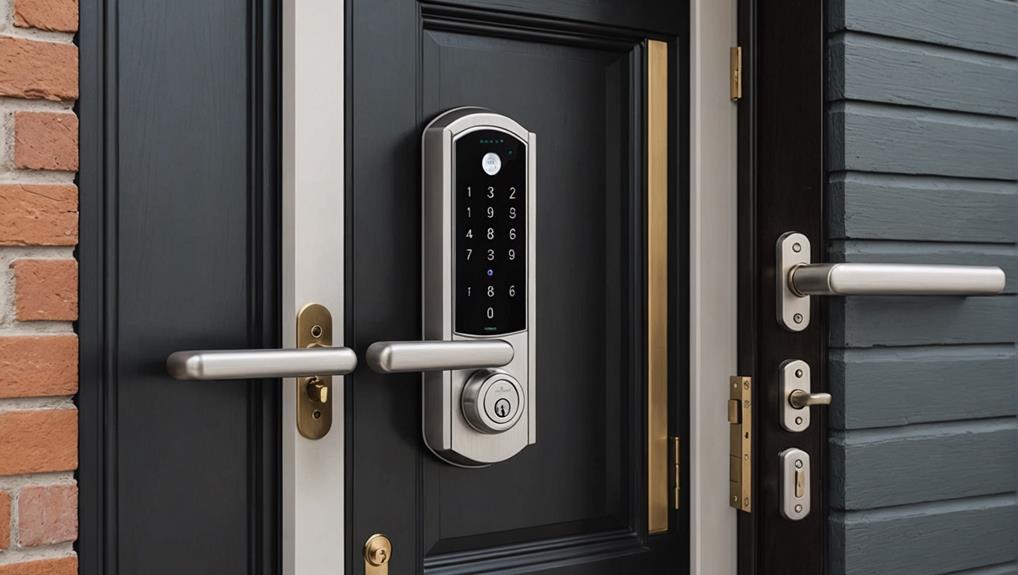
As technology continues to evolve, the domain of home security has seen a significant transformation with the emergence of the latest trends in door locks. Here are some of the latest trends you may want to evaluate:
– Improved WiFi Connectivity: New smart locks have better WiFi connectivity, eliminating the need for hubs and making integration with home networks more seamless.
According to a review of the best smart locks, these advancements are making it easier for homeowners to manage their locks remotely.
- Fingerprint Sensors: Smart locks are increasingly featuring fingerprint sensors for keyless entry, providing a secure and efficient way to access your door.
- Retrofit Smart Locks: Compact retrofit smart locks allow homeowners to upgrade existing deadbolts without having to replace the entire lock system.
These trends reflect a shift towards more convenient, secure, and user-friendly door lock options.
When selecting a new lock for your front door, evaluate these advancements to enhance your home security system.
Security Testing and Performance
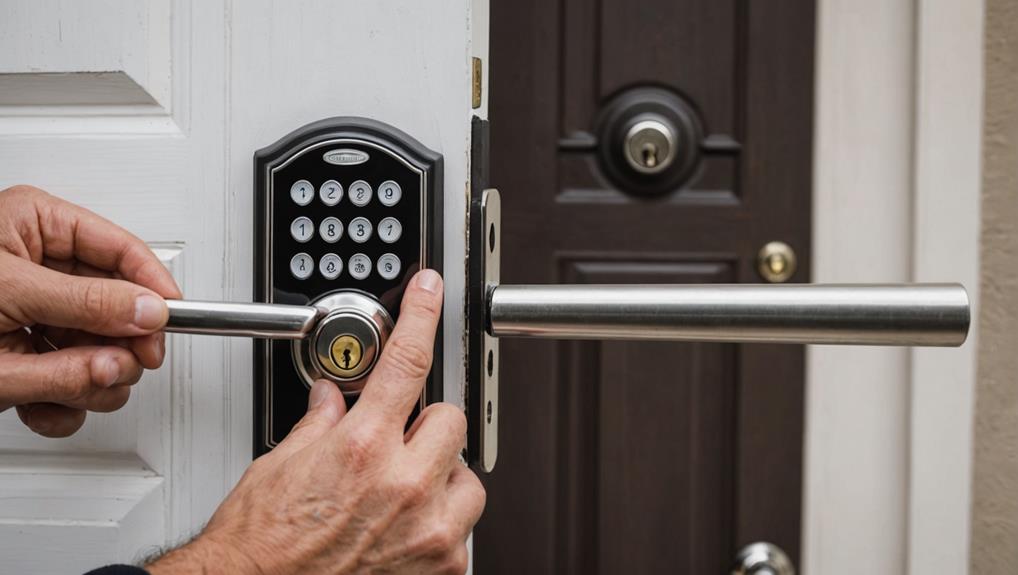
An essential aspect to evaluate when selecting a door lock for your home is the security testing and performance it offers.
Consumer Reports conducts thorough tests on door locks, evaluating their resistance to kick-in, drilling, and picking attacks to gauge overall security effectiveness. Using a custom jig, kick-in tests replicate real break-in attempts with a 100-pound battering ram, revealing how different locks withstand force.
Drilling tests determine how quickly a cordless drill can bypass a lock, showing that many ordinary locks can be compromised in under two minutes. Upgrading hardware can enhance security, as standard locks often come with inadequate strike plates and screws that weaken their effectiveness.
When considering high-security locks for your home, it's vital to look into these features.
Additionally, when considering smart lock integration, remember that the performance of retrofit smart locks heavily relies on the strength of the original deadbolt, emphasizing the importance of selecting a robust deadbolt for ideal security.
Frequently Asked Questions
What Type of Lock Is Best for a Front Door?
For your front door, the best lock depends on your security needs.
Deadbolt locks are tough and Grade 1 deadbolts offer top security. Multi-Point Locking Systems boost resistance by securing multiple points.
Smart Locks offer keyless entry and electronic locks with keypad entry are easy to manage. Mortise locks provide high security.
Consider what matters most: convenience, technology integration, or advanced protection when selecting the ideal lock for your front door.
How Do I Choose a Front Door Lock?
When choosing a front door lock, consider your security needs, door material, lifestyle habits, and budget.
Assess ANSI ratings for security levels, verify lock compatibility with your door type, and evaluate whether a standard deadbolt, smart lock, or multi-point system suits your needs best.
Look for features like heavy-duty strike plates for added security.
Balance cost with desired features and security level, which can range from $30 to $250.
How Do I Know What Lock I Need for My Door?
To know what lock you need for your door, consider the door material, security grade, durability, lifestyle habits, and insurance requirements.
Assess compatibility with specific locks based on the door type. Choose a lock with a higher ANSI Grade for more security.
Opt for brass or steel locks for durability. Evaluate if you prefer traditional deadbolts or smart locks.
Verify the chosen lock meets your insurance's security standards.
What Are the Best Locks to Prevent Break-Ins?
To prevent break-ins, consider Grade 1 deadbolts for superior protection.
Opt for multi-point locking systems for enhanced security.
Smart locks offer convenience and advanced features like remote access.
High-security locks from brands like Medeco resist picking and drilling.
Remember, regular maintenance keeps locks effective.
Choose wisely to keep your home safe from intruders.
Conclusion
When choosing a lock for your front door, it's important to take into account not only security but also ease of installation, maintenance, and any potential future changes. Stay up to date on the latest trends in door locks and make certain to test their security performance before making a decision. By taking these factors into consideration, you can guarantee that your home is properly protected and secure.

